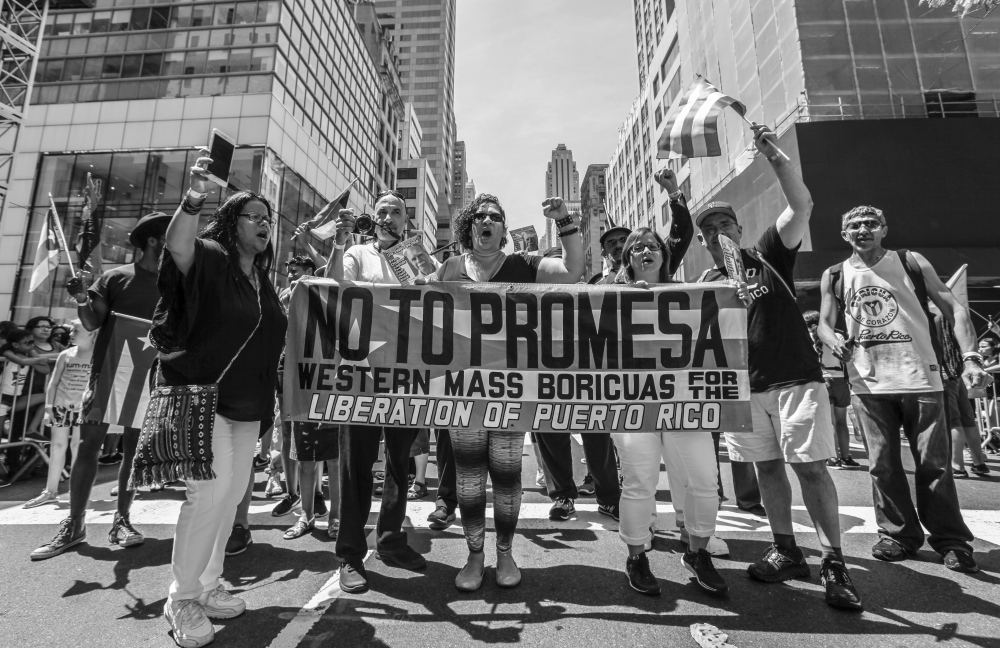- The government has operated for more than two decades borrowing on previous debts which payments have constitutional guarantee.
- Puerto Rico's political relationship with the United States has led Puerto Rico to implement exemption and incentive policies, making the island a tax haven for large US companies.
- Due to exemptions, lack of transparency in government and unequal treatment of the United States with 3.5 million US citizens living in Puerto Rico, the island has an alleged debt of more than $73 billion.
The Fiscal Control Board is established, paid by the people of Puerto Rico with absolute immunity and broad powers to act above the government whose members, appointed by the US President and Congress are receptive to gifts and donations.
The Board currently recommends measures of budget cuts and elimination of rights related to health, education, labort rights, higher taxes and reduction of working hours in order to have liquidity and pay the bondholders.
The Governor of Puerto Rico must deliver a Fiscal Plan that meets the demands of PROMESA.
The Board has the power to revoke public policy and legislation of the Government of Puerto Rico if it understands that it is detrimental to its objective of guaranteeing the payment of the debt.
Without auditing the debt, the Board is the one who will ultimately negotiate the payment of the debt.
LABOR RIGHTS:
- No salary increase until 2021. (There has been no increase for more than 3 years)
- Reduction of sick days and vacations.
- Elimination of the Christmas bonus.
- Reduce by 30% the payroll of government employees.
- Immediatly reduce 4 days of work per month to government employees.
HEALTHCARE:
- Elimination of benefits and coverage of Medicaid. Increase co-payments.
- Shutdown and sale of health centers and services.
- Increase criteria and requirements to access the government health system (Medicaid)
- Reduction of 2 days of work per month to employees health providers.
EDUCATION:
- Shutdown of more than 150 schools.
- Reduction of 2 work days per month to teachers.
- Cut of $450 million to the University of Puerto Rico, increased enrollment, dismissal of professors and administrative staff, elimination of career offerings.
- Debt Audit: A comprehensive and forensic audit of the debt to determine the legal, moral and ethical debt. (A multisectoral commission was created that has determined that more than half of the debt is illegal. Currently the governor ahs the commission inoperative).
- Debt restructuring: After auditing the debt, the country should negotiate the debt directly outside the judicial forum on equal terms with the bondholders. The government must have as its main dury to guarantee the rights and ensure the welfare of citizens.
- Progressive Tax Reform: Establish a rate of contribution on income that increases as income increases, while attacking the problem of tax evasion.
- Economic Development Plan: A decolonization process for the island is neceassary in order to establish free trade with other nations, customs control, the repeal of the coastal trade laws, and PROMESA that together limit and confiscate our resources.
- Protectionist legislation that allows the development of local industries and reduces capital flight
from the mgastores.
- Development of a sustainable agricultural industry, eliminating the unfair competition.
- Export of goods and services and recruitment of local talent where 30,000 university
degrees are awarded annually.
- Puerto Rico's geographical location, road and port infrastructure allows the island to become
a distribution center of merchandise and passanger traffic between the Caribbean, Americas and
Europe and with priviledged natural resources is an asset for the development of tourism.
Source: "A quick guide to understand Puerto Rico's Economic Crisis" by Jeannete Garcia "Somos Puerto Rico, Pal carajo La Junta"

























